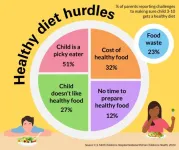(Press-News.org) DALLAS, April 22, 2024 — Scientific researchers in Missouri and Virginia have been awarded nearly $1.4 million each in grants to study ways to extend the life expectancy and improve the quality of life for children with a transplanted heart. These two research awards mark the latest round of funding for a joint $3 million scientific research initiative between the American Heart Association, celebrating 100 years of lifesaving service as the world’s leading nonprofit organization focused on heart and brain health for all, and Enduring Hearts, the only non-profit organization solely dedicated to funding pediatric heart transplant research.
The announcement comes during National Pediatric Transplant Week, April 21-28, 2024.
According to Enduring Hearts, nearly 500 children undergo a heart transplant in the U.S. each year. The average pediatric heart transplant lasts less than 20 years and although medical advances have improved over the years, many of these children and their families still face a lifetime of challenges.
"Aligning with the American Heart Association in this critical work puts a crucial spotlight on pediatric heart transplant research. We look forward to innovative outcomes that will advance this field," said Lynda Lee Smith, Chief Executive Officer of Enduring Hearts.
The new grants are the latest of the Translational Research Awards in Pediatric Heart Transplantation, a collaboration of the American Heart Association and Enduring Hearts that represents a shared research commitment of $5.5 million since 2021.
Contemporary Approach to Desensitization: Targeted therapies for HLA sensitized Pediatric Heart Transplant Candidates at Washington University School of Medicine in St. Louis, Missouri – Led by Lakshmi R. Gokanapudy Hahn, M.D., an assistant professor of pediatrics in the university’s division of pediatric cardiology, this team will study new treatments for children who need heart transplants but who may be sensitized with significant antibody burden. Sensitization is a major obstacle to transplantation, leading to longer wait times, increased waitlist mortality and increased risk of complications like rejection after transplant. Children born with heart disease are at increased risk for having antibodies in their blood that can attack the new heart due to the many surgeries that they have had to undergo for their condition. The current treatment options to get rid of these antibodies do not work well for many children and this team hopes to address this gap in knowledge with the goal of enhancing transplant opportunities and long-term survival for these patients.
Phenotyping Net Immune State with MicroRNAs in Pediatric Heart Transplantation at Inova Schar Heart and Vascular in Falls Church, Virginia – Led by Palak Shah, M.D., director of the Inova Cardiovascular Genetics Center and medical director of mechanical circulatory support for Inova Fairfax Medical Campus, this team will work to develop a new blood test that doctors can use to optimize the immunosuppression medications needed after transplant. More than 15-20% of transplant patients have acute rejection of their new heart in the first year. It’s important that patients are given the best treatments that can balance the risk of complications such as infection against potential organ rejection. This study seeks to determine if a molecule called a microRNA can help in that process. The goal is to personalize the dose of medications a patient needs to adequately suppress their immune system and reduce the risk of rejecting the new heart.
"The aims of these studies are well aligned with Enduring Hearts’ priorities to improve pre-transplant candidacy and help develop novel post-transplant surveillance therapies. We are thrilled to collaborate with the American Heart Association to fund these two multicenter research initiatives,” said Janet Scheel, M.D., chair of Enduring Hearts Scientific Advisory Committee.
“The American Heart Association is proud to support this research aimed at improving the lives and long-term survival of our youngest survivors. This highly innovative research will hopefully open new doors of discovery that result in life-changing opportunities for these children, giving health and hope to them and their families,” said Joseph C. Wu, M.D., Ph.D., FAHA, current volunteer president of the American Heart Association, director of the Stanford Cardiovascular Institute and the Simon H. Stertzer Professor of Medicine and Radiology at Stanford School of Medicine. “We are excited about our ongoing collaboration with Enduring Hearts and crucial impact the findings from these projects can potentially make in real-world treatments.”
The new research grants began April 1 and will extend for four years.
###
About the American Heart Association
The American Heart Association is a relentless force for a world of longer, healthier lives. We are dedicated to ensuring equitable health in all communities. Through collaboration with numerous organizations, and powered by millions of volunteers, we fund innovative research, advocate for the public’s health and share lifesaving resources. The Dallas-based organization has been a leading source of health information for a century. During 2024 - our Centennial year - we celebrate our rich 100-year history and accomplishments. As we forge ahead into our second century of bold discovery and impact our vision is to advance health and hope for everyone, everywhere. Connect with us on heart.org, Facebook, X or by calling 1-800-AHA-USA1.
The American Heart Association has funded more than $5.7 billion in lifesaving cardiovascular research since 1949.
The Association receives funding primarily from individuals; foundations and corporations (including pharmaceutical, device manufacturers and other companies) also make donations and fund specific Association programs and events. The Association has strict policies to prevent these relationships from influencing the science content. Revenues from pharmaceutical and biotech companies, device manufacturers and health insurance providers and the Association’s overall financial information are available here.
About Enduring Hearts
Enduring Hearts is a national nonprofit that launched in 2013 to fund innovative research globally to improve longevity and the quality of life for children living with a heart transplant. Enduring Hearts has funded over $10M in targeted pediatric heart transplant research. Enduring Hearts provides a variety of programs to offer both tangible and educational support to families during their transplant. Connect with us on enduringhearts.org, Facebook or X.
END
Scientists in Missouri, Virginia receive pediatric heart transplantation research grants
American Heart Association and Enduring Hearts award nearly $3 million in grants in the latest round of funding for pioneering research in heart transplants for children
2024-04-22
ELSE PRESS RELEASES FROM THIS DATE:
Same species, different sizes: rare evolution in action spotted in island bats
2024-04-22
A University of Melbourne researcher has spotted a rare evolutionary phenomenon happening rapidly in real time in bats living in the Solomon Islands.
Dr Tyrone Lavery reports in a paper published in Evolution that two groups of leaf-nosed bats with vastly different body sizes that were thought to be separate species are an example of a rare type of parallel evolution. Parallel evolution is when different populations living in similar environments evolve similar features independently.
The smaller bat, Hipposideros diadema, is found across its six main islands and many smaller islands. It is ...
New technology uncovers mechanism affecting generation of new COVID variants
2024-04-22
The SARS-CoV-2 virus that causes COVID has the unsettling ability of often generating variants of itself. Other viruses also mutate, but as SARS-CoV-2 quickly spread throughout the entire human population during the pandemic, killing millions, the virus’ dynamic evolution posed a serious problem: it repeatedly challenged our bodies’ immune response fighting the virus and hindered the process of getting updated vaccines ready.
Understanding the genetic mechanism fueling SARS-CoV-2’s ability to generate variants can go a long way in keeping COVID at bay. In this study published in Nature Microbiology, researchers at Baylor College of Medicine and collaborating institutions developed ...
Planning at multiple scales for healthy corals and communities
2024-04-22
Governments in the Mesoamerican Reef region are exploring the use of nature-based solutions to strengthen coral health and societal benefits for coastal communities. A new study led by Stanford researchers in collaboration with scientists from the World Wildlife Fund, the Healthy Reefs Initiative, and others from the Smart Coasts project quantified the outcomes of different watershed interventions to support coral health at regional versus national scales, and identified target areas that could improve both ecosystem and societal benefits nationally and across the region.
The nature-based approaches evaluated as key ...
U of T researchers map protein network dynamics during cell division
2024-04-22
An international team led by researchers at the University of Toronto has mapped the movement of proteins encoded by the yeast genome throughout its cell cycle. This is the first time that all the proteins of an organism have been tracked across the cell cycle, which required a combination of deep learning and high-throughput microscopy.
The team applied two convolutional neural networks, or algorithms, called DeepLoc and CycleNet, to analyze images of millions of live yeast cells. The result was a comprehensive map identifying where proteins are located and how they move and change in abundance ...
Pressure in the womb may influence facial development
2024-04-22
Physical cues in the womb, and not just genetics, influence the normal development of neural crest cells, the embryonic stem cells that form facial features, finds a new study led by UCL researchers.
The study published in Nature Cell Biology found that an increase in hydrostatic pressure sensed by the embryo can hinder the healthy development of facial features in mouse and frog embryos and in human embryoids (cell structures grown in the lab from human stem cells), suggesting that differences in pressure might affect the risk of facial malformations.
The ...
AI weather forecasts captured Ciaran’s destructive path
2024-04-22
Artificial intelligence (AI) can quickly and accurately predict the path and intensity of major storms, a new study has demonstrated.
The research, based on an analysis of November 2023’s Storm Ciaran, suggests weather forecasts that use machine learning can produce predictions of similar accuracy to traditional forecasts faster, cheaper, and using less computational power.
Published in npj Climate and Atmospheric Science, the University of Reading study highlights the rapid progress and transformative potential of AI in weather prediction.
Professor Andrew Charlton-Perez, ...
Feedback loop that is melting ice shelves in West Antarctica revealed
2024-04-22
Feedback loop that is melting ice shelves in West Antarctica revealed
New research has uncovered a feedback loop that may be accelerating the melting of the floating portions of the West Antarctic Ice Sheet, pushing up global sea levels.
The study, published in Science Advances, sheds new light on the mechanisms driving the melting of ice shelves beneath the surface of the ocean, which have been unclear until now.
The West Antarctic Ice Sheet has been losing mass in recent decades, contributing to global sea level rise. If it were to melt entirely, global sea levels would rise by around five meters.
It’s known that Circumpolar Deep Water (CDW), ...
How does aspirin help prevent colorectal cancer development and progression?
2024-04-22
Long-term daily use of aspirin can help to prevent the development and progression of colorectal cancer, but the mechanisms involved have been unclear. New research has revealed that aspirin may exert these protective effects by boosting certain aspects of the body’s immune response against cancer cells. The findings are published by Wiley online in CANCER, a peer-reviewed journal of the American Cancer Society.
To investigate the effects of aspirin (a nonsteroidal anti-inflammatory drug) on colorectal cancer, investigators in Italy obtained tissue samples from 238 patients who underwent surgery for colorectal cancer in 2015–2019, 12% of whom were aspirin ...
3 in 5 parents play short order cook for young children who don’t like family meal
2024-04-22
While most parents of preschool and elementary aged children strive to give their children a balanced, nutritional diet, some of their strategies to promote healthy eating may backfire, a national poll suggests.
A top example from the report: Three in five parents customize meals if their child doesn’t like what everyone else is eating.
Meanwhile, one in eight parents require children to eat everything on their plate, according to the University of Michigan Health C.S. Mott Children’s Hospital National Poll on Children’s Health. And while just one in three believe the standard American diet is healthy for kids, few have tried alternative, potentially more nutritional ...
Japan’s premodern concept of nature at root of distinctive mindset in early childhood education
2024-04-22
Osaka, Japan — Observers of Japanese early childhood education and care have pointed to the mindset of educators watching over and waiting on preschoolers as being an intriguing tendency. This mimamoru approach has its roots in a premodern concept of nature, according to Professor Yosuke Hirota at the Graduate School of Literature and Human Sciences of Osaka Metropolitan University.
Professor Hirota looked into the works of Sozo Kurahashi (1882-1955) and Kitaro Nishida (1870-1945) to see how this concept of nature from the past made its way into education in the present day. Kurahashi’s writing on ...
LAST 30 PRESS RELEASES:
Novel camel antimicrobial peptides show promise against drug-resistant bacteria
Scientists discover why we know when to stop scratching an itch
A hidden reason inner ear cells die – and what it means for preventing hearing loss
Researchers discover how tuberculosis bacteria use a “stealth” mechanism to evade the immune system
New microscopy technique lets scientists see cells in unprecedented detail and color
Sometimes less is more: Scientists rethink how to pack medicine into tiny delivery capsules
Scientists build low-cost microscope to study living cells in zero gravity
The Biophysical Journal names Denis V. Titov the 2025 Paper of the Year-Early Career Investigator awardee
Scientists show how your body senses cold—and why menthol feels cool
Scientists deliver new molecule for getting DNA into cells
Study reveals insights about brain regions linked to OCD, informing potential treatments
Does ocean saltiness influence El Niño?
2026 Young Investigators: ONR celebrates new talent tackling warfighter challenges
Genetics help explain who gets the ‘telltale tingle’ from music, art and literature
Many Americans misunderstand medical aid in dying laws
Researchers publish landmark infectious disease study in ‘Science’
New NSF award supports innovative role-playing game approach to strengthening research security in academia
Kumar named to ACMA Emerging Leaders Program for 2026
AI language models could transform aquatic environmental risk assessment
New isotope tools reveal hidden pathways reshaping the global nitrogen cycle
Study reveals how antibiotic structure controls removal from water using biochar
Why chronic pain lasts longer in women: Immune cells offer clues
Toxic exposure creates epigenetic disease risk over 20 generations
More time spent on social media linked to steroid use intentions among boys and men
New study suggests a “kick it while it’s down” approach to cancer treatment could improve cure rates
Milken Institute, Ann Theodore Foundation launch new grant to support clinical trial for potential sarcoidosis treatment
New strategies boost effectiveness of CAR-NK therapy against cancer
Study: Adolescent cannabis use linked to doubling risk of psychotic and bipolar disorders
Invisible harms: drug-related deaths spike after hurricanes and tropical storms
Adolescent cannabis use and risk of psychotic, bipolar, depressive, and anxiety disorders
[Press-News.org] Scientists in Missouri, Virginia receive pediatric heart transplantation research grantsAmerican Heart Association and Enduring Hearts award nearly $3 million in grants in the latest round of funding for pioneering research in heart transplants for children



